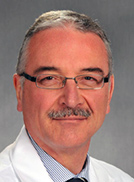Final overall survival data from PALOMA-3 assessing palbociclib plus fulvestrant in women with HR+/HER2- advanced breast cancer failing previous hormonal therapy
Final overall survival (OS) from the randomized, phase III PALOMA-3 trial demonstrate a clinically meaningful survival improvement when adding the CDK4/6 inhibitor palbociclib to fulvestrant in women with hormone receptor positive (HR+), human epidermal growth factor receptor-2 negative (HER2-) advanced breast cancer who relapsed or progressed on hormonal therapy. In the intent-to-treat population, the median OS was prolonged with 6.9 months in patients treated with palbociclib plus fulvestrant compared to patients receiving fulvestrant and placebo. This survival benefit was even more pronounced in patients with sensitivity to prior endocrine therapy. In these patients, the absolute survival benefit with the CDK4/6 containing treatment mounted to 10 months. This makes PALOMA-3 the first study with a CDK4/6 inhibitor suggesting that the observed benefit in progression-free survival (PFS) is translated into a benefit in OS. However, caution is warranted, as this study was not designed to show a difference in OS and the observed survival benefit did not reach statistical significance in this analysis.
Most patients with HR+ breast cancer become resistant to hormonal therapies over time and inhibiting CDK4/6 has been identified as a target to overcome or delay resistance to hormonal therapy in advanced HR+/HER2-breast cancer. PALOMA-3 included 521 patients who had relapsed or progressed on prior endocrine therapy and randomised them between palbociclib (125mg/day orally, schedule 3/1) plus fulvestrant (500mg per standard of care) or placebo plus fulvestrant. In previous presentations of this trial, the palbociclib-fulvestrant combination already demonstrated a significantly improved PFS compared to fulvestrant and placebo (median PFS: 11.2 vs. 4.6; HR[95%CI]: 0.50[0.40–0.62]; p< 0.000001). OS was a key secondary objective of PALOMA-3 and ESMO 2018 featured the presentation of the final analysis of this endpoint, with a median follow-up of 44.8 months.
Results showed that the median OS improved by 6.9 months with palbociclib plus fulvestrant (median OS 34.9 months, 95%CI: 28.8-40.0) compared to placebo plus fulvestrant (median OS 28.0 months, 95%CI: 23.6-34.6, 1-sided p=0.043). While this difference did not reach statistical significance, the investigators argued that the benefit observed with palbociclib is clinically significant. The improvement in OS was more pronounced in patients with sensitivity to prior endocrine therapy. In this subgroup of patients (N=410), palbociclib + fulvestrant was associated with a median OS of 39.7 months, which was 10 months longer than the 29.7 months median OS seen with fulvestrant and placebo (HR[95%CI]: 0.721[0.551-0.942]; p= 0.0081). Also in patients without visceral disease at baseline, the survival benefit with palbociclib was particularly pronounced, with an absolute difference in median OS of 11.5 months (median OS: 46.9 vs. 35.4 months; HR[95%CI]: 0.69[0.46-1.04).
In summary, this randomised phase III trial shows for the first time that the improvement in PFS seen with a CDK4/6 inhibitor in the metastatic setting for ER+/HER2- breast cancer is translated into an absolute survival benefit. On a critical note it needs to be said that this study was not designed to demonstrate a benefit in OS and also the statistical methods in this trial (using a 1-sided p-value instead of the normal 2-sided p-value) are subject to debate. As such, further validation is needed. Results of the other trials conducted with CDK4/6 inhibitors will contribute to confirm the estimate of the OS benefit observed in this study.
Reference
Cristofanelli M, Dlamon D, Bondarenko I, et al. Overall survival (OS) with palbociclib plus fulvestrant in women with hormone receptor-positive (HR+), human epidermal growth factor receptor 2-negative (HER2−) advanced breast cancer (ABC): Analyses from PALOMA-3. Presented at ESMO 2018; Abstract LBA2_PR


